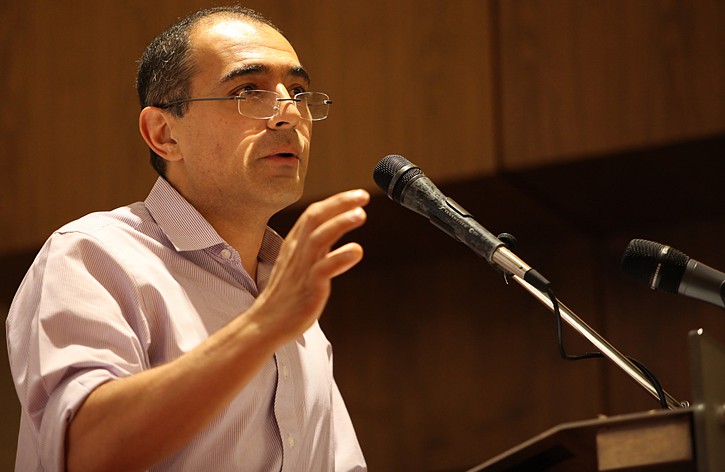
Hashemi, the director of the Centre for Middle East Studies, a research centre at the University of Denver, gave a talk titled, ‘Defeating the Islamic State: Reflections on the Crisis of State and Society in the Middle East’ on the same day as he addressed an Oireachtas committee on the Syrian conflict.
The academic began by giving an explanation for the rise of ISIS, first highlighting the false thinking of those who he said mistakenly think ISIS has its origins in the US’s post 9/11 interventions in the Middle East, and who think that “ISIS can be defeated as quickly as it (seemingly) emerged.” In fact, he said, “events have been brewing for many decades.”
Given ISIS’s aspirations to a worldwide caliphate, why has it taken root in Iraq and Syria? “Political despotism and tyranny” have mostly affected those two countries, and the human rights violations that distinguish them from other countries in the region “have left a brutal legacy”.
Hashemi said that the various wars Iraq has had over the last three decades – with Iran, Kuwait, and the US – have “broken” the country’s government and society. After the fall of Saddam Hussain, the democratically elected government became dominated by the previously marginalised Shia majority. “Gradually, increasingly”, Sunnis were, themselves, first marginalised and then persecuted. ISIS was able to recruit young Sunnis to its cause.
There exists a “far greater crisis of legitimacy in Syria” where citizens have been under the rule of the Al-Assad family for 41 years. “One of the most oppressive states in the Arab world”, the Syrian regime engages in “merciless brutality” and the situation in the country has been described as the “worst moral and humanitarian crisis of the 21st century.”
Hashemi noted that the Syrian uprising, in March 2011, began peacefully. But a regime with a “heinous human rights record” acted predictably by “brutally suppressing” the demonstrators. Aided by defections from the Syrian army, this brutality led to a militarisation of the uprising followed by radicalisation. In a country with a substantial Sunni majority, the “social conditions were ripe” for a radicalised opposition, and the “remnants of Al Qaeda in Iraq” moved across the border into Syria.
Hashemi apportioned blame to particular countries in the region. Iran’s financial and military support for the Syrian regime “has allowed Assad to remain in power … He would have been toppled by now.” In a country without free press, Hashemi predicts that the realisation of Iran’s role in maintaining Al-Assad in power will lead to a “moment of deep national humiliation and shame.”
The “culture of ugliness” within Islam is a recent development, and its proliferation “has its roots in the policies of Saudi Arabia” whose policy of spreading its interpretation of Islam has had a “corrosive effect” worldwide. There is a fundamental inability to “reconcile” Saudi Arabia’s Wahabi interpretation “with the complexities of modern society”. Hashemi called into question how the US can ally with a country that has created such “deep sectarianism” within Islam.
There are “eerie parallels” between the Syrian crisis today and that of Bosnia in the 90s, he said. In both instances, the international community “stood on the sidelines” while “chaos and anarchy” ravaged the respective countries. “We should learn that large scale genocide … cannot be contained within borders.” Critical of the US response throughout, Hashemi chided Barack Obama and his administration for “pretending that it will go away; that it will resolve itself.” “The policy has failed”, resulting in a subsequent reprioritisation of Syria. But now “the conflict is much more difficult to resolve.”
While the plan of action in Iraq, he says, is correct (bolster Iraqi administration and army, bring Sunnis into government), the outcome will be “determined in Syria … and there (Obama) has no plan.” And “in many ways he has made things a lot worse.”
The solution he said was to “defeat the Syrian regime and stabilise the subsequent administration” – perhaps by “increasing support for the moderate opposition. Ultimately, “the crisis began in Syria and will end in Syria.”






